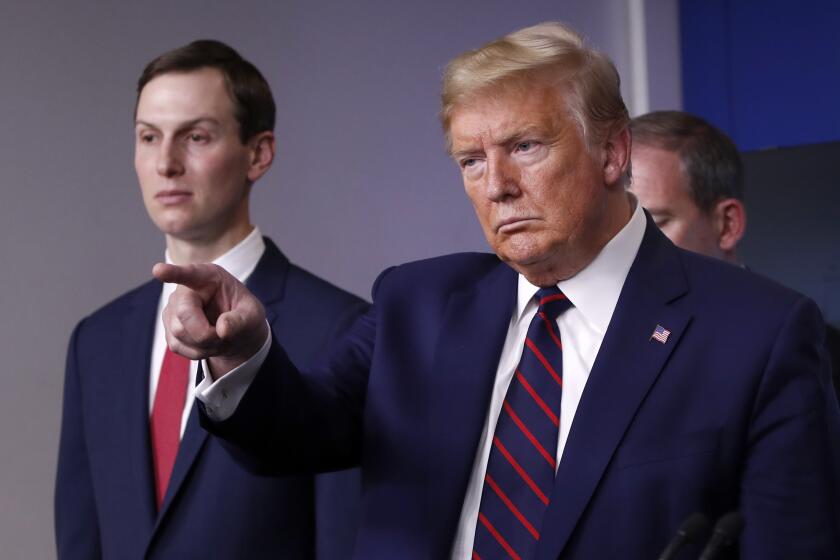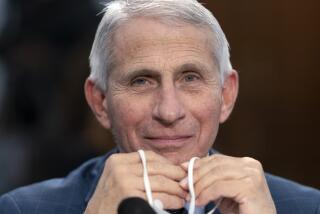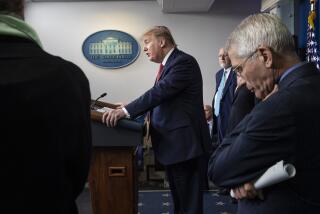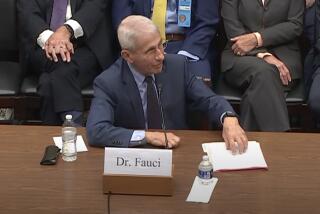Fauci warns coronavirus not ‘under control,’ says rapid reopening risks new outbreaks
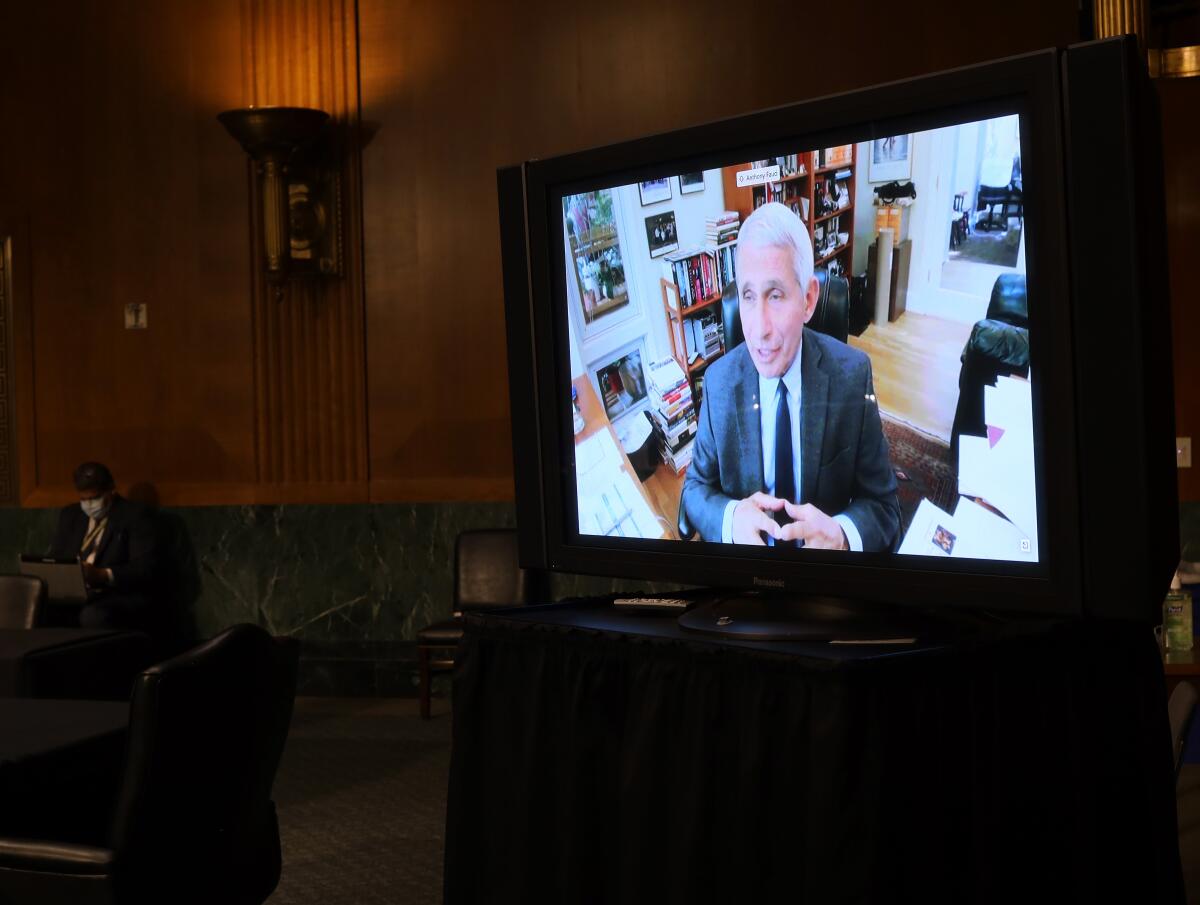
- Share via
WASHINGTON — Dr. Anthony Fauci, the nation’s top infectious disease expert, warned Congress on Tuesday that states that push too quickly to reopen businesses and allow public gatherings during the COVID-19 pandemic could “trigger an outbreak that you may not be able to control.”
Testifying before the Senate health committee, the longtime government scientist largely avoided direct criticism of President Trump or other GOP leaders, but struck a significantly more cautious tone than the president, who has pushed for states to quickly end restrictions on business and other activities that were imposed to blunt the spread of the virus.
“If you think we have it completely under control, we don’t,” Fauci told the panel, warning about potential spikes in infections if states move too fast. “The consequences could be really serious.”
“My concern is that if states or cities or regions, in their attempt, understandable, to get back to some form of normality, disregard to a greater or lesser degree the checkpoints that we put in our guidelines ... there is a real risk that you will trigger an outbreak that you may not be able to control.”
That “paradoxically will set you back, not only leading to some suffering and death that could be avoided, but it could even set you back on the road to trying to get economic recovery, because it would almost turn the clock back,” he said.
Fauci, who heads the National Institute of Allergy and Infectious Diseases and is the most respected member of the president’s coronavirus task force, testified amid growing tension between public health experts on the one hand and Trump and his political allies on the other.
Trump increasingly has minimized the health impacts of the outbreak while calling for an end to the lockdowns that have devastated the nation’s economy.
The U.S. has seen at least 1.3 million infections and nearly 81,000 confirmed deaths from the virus, according to a tally by Johns Hopkins University. The death toll is far and away the highest in the world.
Fauci said Tuesday that the actual death toll is “likely higher,” noting that in New York City, for example, many people may have died from the virus in their homes and have not been counted in official totals.
He and other senior administration officials, including the heads of the Centers for Disease Control and Prevention and the Food and Drug Administration, also sounded encouraging notes about progress on ramping up testing and the development of potential treatments and vaccines.
Fauci told senators that the U.S. has “multiple shots” at developing a vaccine for preventing the coronavirus and that researchers hope to know by winter whether at least one of the candidates will work.
At least eight vaccine candidates are in development, Fauci said. Dr. Stephen Hahn, the FDA commissioner, said health officials are working aggressively to ensure that drugmakers will be able to quickly ramp up production when an effective vaccine is discovered.
But Fauci warned that the efficacy of the potential vaccines remains an issue and that “negative consequences” are also a concern.
And he dismissed a suggestion from the committee’s chairman, Sen. Lamar Alexander (R-Tenn.), that a vaccine or treatment might be available by the time schools reopen in the fall, calling that “a bridge too far.”
Fauci more sharply rebuffed Sen. Rand Paul (R-Ky.), who suggested that schools should be reopened because evidence suggests the virus does not seriously affect children.
“I think we’d better be careful if we are not cavalier in thinking that children are completely immune to the deleterious effects” of the illness, Fauci said, noting that there is a lot unknown about the virus and its effects. He noted recent cases of severe illness in children that may be linked to the virus.
And he made clear that he did not agree with many of Trump’s optimistic statements about having the disease under control.
As the U.S. coronavirus death toll hits 80,000, Trump grumbles over the pace of reopening the economy. New York to ease restrictions upstate.
“I think we are going in the right direction, but the right direction does not mean we have by any means total control of this outbreak,” he said.
The main checkpoint in the guidelines, Fauci noted, is a 14-day decline in cases. Many of the states that have aggressively moved to lift restrictions on business have not achieved that.
Alabama, Kentucky, Maine, Mississippi, Missouri, Nebraska, Ohio, Oklahoma, Tennessee and Utah are among the states that have moved to reopen large parts of their economies, but have not met the 14-day downward trajectory in new cases or positive test rates.
At the White House, Press Secretary Kayleigh McEnany, asked about the warnings that the country could see a spike in cases, insisted that Trump has stuck to the administration’s announced policies.
“He has encouraged the states to follow the guidelines,” she said.
Also coming in for criticism at Tuesday’s hearing was the Trump administration’s frequent talking point that it has successfully ramped up testing to allow Americans to resume normal activities.
Adm. Brett Giroir, the assistant secretary for health at the Department of Health and Human Services who oversees the testing effort, said he expects the U.S. will be able to conduct 40 million-50 million tests per month by September and noted the U.S. is now conducting more tests per person than South Korea, which is widely held up as an international model for containing both the pandemic and the resulting economic damage.
On Monday, Trump said at the White House that the testing problem had been solved.
But the rosy picture was slammed by Sen. Mitt Romney (R-Utah). South Korea doesn’t need to test as much as the U.S. because it was able to quickly suppress the disease by implementing widespread testing soon after the first cases were discovered, Romney noted. That’s unlike the U.S., which has taken months to ramp up, he said.
“I find our testing record nothing to celebrate whatsoever,” Romney added.
With its on-again, off-again coronavirus task force, the Trump White House has reverted to the same problem it has had from the beginning: Nobody’s in charge, least of all the president.
Fauci testified remotely because he is partially self-quarantining after contact with a White House staff member who tested positive for the virus. Alexander also participated remotely because one of his staff members has tested positive. Several other senators similarly stayed away from the committee room.
Several committee Republicans used their questioning to defend Trump, but Alexander made clear as he opened the hearing that the defense has limits: The country still needs more “widespread testing,” he said.
More to Read
Sign up for Essential California
The most important California stories and recommendations in your inbox every morning.
You may occasionally receive promotional content from the Los Angeles Times.

